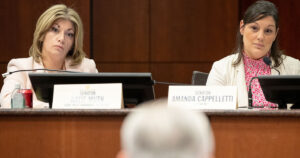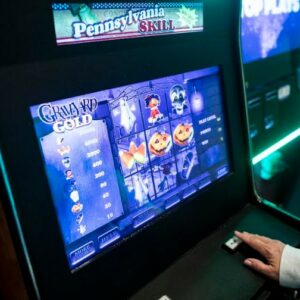They have funny names like Piggy’s Big Break, Plunderin’ Pirates, and The Great Train Robbery. But Delaware Valley Democrats say the skill games popping up in gas stations and convenience stores are no laughing matter. They say the games “steal money that should be going to the Pennsylvania Lottery” and the state programs funded by it.
Supporters of the skill games and the local businesses that own them say Harrisburg is just upset that bars and restaurants are making money instead of the state government, adding it’s not the gaming that officials object to; they don’t like losing their cut.
The Democratic Policy Committee hearing, held last week at the Radnor Township Building, featured panels discussing regulation, law enforcement, gaming, and ongoing court cases over the games.
Sen. Amanda Cappelletti (D-Montgomery/Delaware), who hosted the hearing with Policy Committee Chair Sen. Katie Muth (D-Chester/Montgomery/Berks), has circulated a cosponsor memo for a bill to add “skill games” — or as she calls them, “these predatory machines” — to the list of banned devices.
Mike Barley with Pace-O-Matic, the largest distributor of skill games, told DVJournal the state’s powerful casino lobby wants the devices banned, while his industry is open to regulation and taxation. And, he noted, the Pace-O-Matic cabinets are made in Williamsport.
“The irony is, the casino industry has spent years saying we are illegal,” said Barley, but courts have ruled in the skill games companies favor. “So now they’re saying we’re unregulated. We agree. And the only thing standing between us and being regulated is the casinos. We would like to see rules put in place, such as limiting the number of games in locations.”
The Democrats at the Policy Committee hearing, like Delaware County District Attorney Jack Stollsteimer, took a dim view of the devices. Stollsteimer claimed they “present a soft target” for criminals who break into them and steal money. The spaces are public but “unsecured.”

Sens. Katie Muth (left) and Amanda Cappelletti
He said he also believes it is an “underreported crime because the legality of these machines is somewhat dubious.
“We would like to see some kind of regulation. Take a look at where these things are located and what security is in place,” said Stollsteimer.
Philadelphia Councilman Curtis Jones said skill games are suddenly appearing in his district, especially “lower-end neighborhoods” and stores that sell liquor by the glass at 7 a.m. and “loosey” cigarettes (not in packs) or “unlicensed” medical marijuana sites.
“These machines, it’s like throwing a match on gasoline. You create an environment where bad things happen (like) winners who were victimized as they came out of the store,” said Jones. He said people watch the machines and then let their cohorts know when a winner is about to leave so the winner can be mugged. He was also concerned about kids using their lunch money to play the skill games and senior citizens on fixed incomes spending their limited funds on them.
“It creates a toxic environment for crime,” he said, noting he is “hopeful” the legislature will “come up with regulations.”
Skill games supporters respond that the state sells quite a few lottery tickets in those same communities and has for years — including to people on fixed incomes. As for crime, Barley said the small businesses that house the skill games also sell liquor and tobacco, so those owners know how to keep children away from activities that are for adults only.
And, he noted, there are also crimes associated with the casinos, such as children waiting in locked cars while their parents gamble and high rollers being kidnapped after leaving casinos.
Crime is “a difficult issue,” said Barley. “It’s something we all have to work on.”
Gaming Control Board director Kevin O’Toole said his agency is ready and able to regulate the games of skill and is waiting for legislation. He appreciates a bill that Sen. Gene Yaw (R-Bradford/Sullivan/Lycoming/Union) has introduced. However, that bill gives regulation of those games to a new division within the Department of Revenue rather than his agency.
Two casino industry representatives also testified.
Jeff Morris with Penn Entertainment called skills games “an unregulated, unmitigated disaster.” Currently, there are “zero protections.” There is nothing to prevent money laundering or to keep compulsive gamblers and underage kids from playing. The situation is “a wild west.” Plus, he noted there is no protection for consumers.
The games lead to robberies and even “a tragic case” of a “cold-blooded murder” in Hazelton.
Chris Cykle, senior vice president of the American Gaming Association, a casino trade group, said in the commonwealth, casinos are “an economic engine” in 17 locations that produce 22,000 jobs, $6 trillion in economic impact, and $2.2 billion in tax revenue. Employees undergo extensive background checks, and slot machines are checked to be sure they work properly.
He said that because the skill games are not state-regulated, Pennsylvania loses more than $1 billion it would otherwise receive.
Skill games supporters say that the state isn’t entitled to the money, even if that number is correct. If consumers are happy playing these games, and the businesses are happy to use the profits to stay afloat in a tough economy, that’s good news for Pennsylvania.
“We, as an industry, have come to the table and said we’d like to pay an extra tax, which, as you know, doesn’t always happen,” said Barley. “And the small businesses where the skill games are located get to keep 92 percent of the profits, and “the revenue is helpful to them.
“We’d like to see something like Sen. Yaw’s bill pass,” Barley continued. As for regulation by the Gaming Control Board, “They’ve been involved in every attack of the skill game industry over the years, at the behest of the casinos… They’ve moved away from being a regulator of the casino industry to being the lap dog of the casino industry.”
Please follow DVJournal on social media: Twitter@DVJournal or Facebook.com/DelawareValleyJournal

